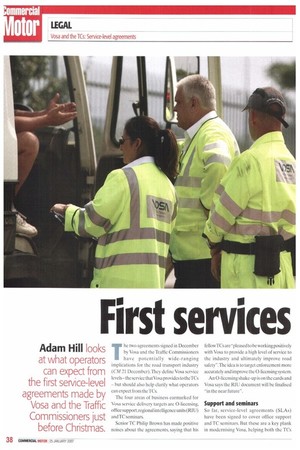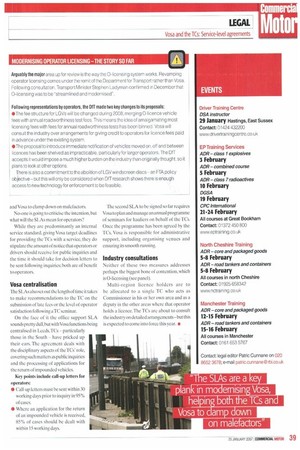First services
Page 38

Page 39

If you've noticed an error in this article please click here to report it so we can fix it.
Adam Hill loos at what operators can expect from the first service-level agreements made by Vosa and the Traffic Commissioners just
The two agreements signed in December by Vosa and the Traffic Commissioners have potentially wide-ranging implications for the road transport industry (CM 21 December). They define Vosa service levels—the service that Vosa provides to theTCs — but should also help clarify what operators can expect from theTCs.
The four areas of business earmarked for Vosa service delivery targets are 0-licensing. office support, regional intelligence units (RIU) and TC seminars.
Senior TC Philip Brown has made positive noises about the agreements, saying that his fellowTCs are "pleased to be working positively with Vosa to provide a high level of service to the industry and ultimately improve road safety".The idea is to target enforcement more accurately and improve the 0-licensing system.
An 0-licensing shake-up is on the cards and Vosa says the RIU document will be finalised "in the near future".
Support and seminars
So far, service-level agreements (SLAs) have been signed to cover office support and TC seminars. But these are a key plank in modernising Vosa, helping both the TCs and Vosa to clamp down on malefactors. No-one is going to criticise the intention, but what will the SLAs mean for operators?
While they are predominantly an internal service standard, giving Vosa target deadlines for providing the TCs with a service, they do stipulate the amount of notice that operators or drivers should receive for public inquiries and the time it should take for decision letters to be sent following inquiries; both are of benefit to operators.
Vosa centralisation
The SLAs also set out the length of time it takes to make recommendations to the Tc on the submission of late fees or the level of operator satisfaction following a TC seminar.
On the face of it the office support SLA sounds pretty dull,but with Vosa functions being centralised in Leeds, TCs particularly those in the South have pricked up their ears. The agreement deals with the disciplinary aspects of the TCs' role, covering such matters as public inquiries and the processing of applications for the return of impounded vehicles.
Key points include call-up letters for operators: • Call-up letters must be sent within 30 working days prior to inquiry in 95% of cases.
• Where an application for the return of an impounded vehicle is received, 85% of cases should be dealt with within 15 working days. "Me second SLA to be signed so far requires Vosa to plan and manage an annual programme of seminars for hauliers on behalf of the TCs. Once the programme has been agreed by the ICs, Vosa is responsible for administrative support, including organising venues and ensuring its smooth running.
Industry consultations
Neither of these two measures addresses perhaps the biggest bone of contention, which is 0-licensing (see panel).
Multi-region licence holders are to be allocated to a single TC who acts as Commissioner in his or her own area and as a deputy in the other areas where that operator holds a lice nce. The TCs are about to consult the industry on detailed arrangements but this is expected to come into force this year. •






















































































































































































